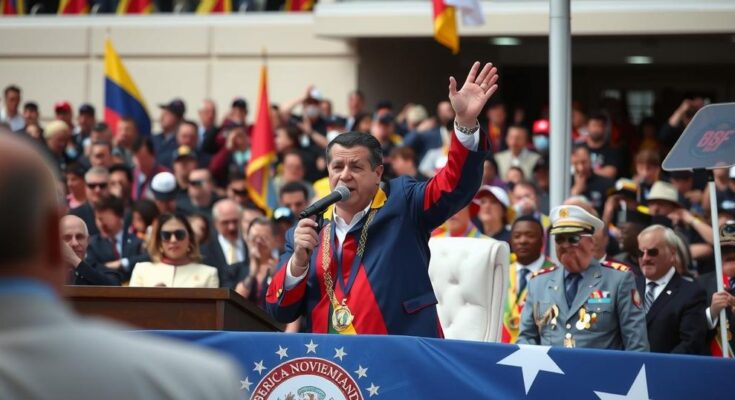Nicolás Maduro has been sworn in for a controversial third term amid allegations of election fraud. His opponents claim the true winner was Edmundo González, as Maduro’s regime faces widespread international and domestic condemnation. Major leftist leaders boycotted the ceremony, while Maduro delivered a defiant speech proclaiming his legitimacy, despite global calls for democracy and governance accountability. The potential for continued unrest in Venezuela remains high, with opposition leaders urging non-violent resistance against the regime.
Nicolás Maduro has been sworn in for a controversial third term as president of Venezuela, amidst widespread condemnation both domestically and internationally regarding the alleged illegitimacy of his election victory in July 2024. During the sparsely attended ceremony in Caracas, which many democratic leaders boycotted, Maduro proclaimed it a triumph for Venezuelan democracy; however, his opponents maintain he has provided no evidence to support his claims of having won the election. Reports from various political analysts confirm that his chief opponent, Edmundo González, emerged as the true victor, as public dissent against Maduro’s handling of Venezuela’s crippling economic crisis continues to mount.
The event was marked by the absence of notable leftist leaders such as Brazil’s Luiz Inácio Lula da Silva and Colombia’s Gustavo Petro, who have openly rejected Maduro’s authority. In stark contrast, representatives from nations with authoritarian regimes, including Cuba and Nicaragua, were present, signaling their support for Maduro’s government. In a defiant 90-minute address, Maduro characterized his leadership as a continuation of a “democratizing revolution” and labeled his adversaries in harsh terms, asserting that his presidency is rooted in the will of the people rather than foreign influences.
International reactions have been overwhelmingly critical. Chilean President Gabriel Boric labeled Maduro’s regime a dictatorship, and U.S. Secretary of State Antony Blinken emphasized that Maduro has lost all legitimacy and authority to govern. Concurrently, the United Kingdom’s Foreign Secretary, David Lammy, described Maduro’s claims to power as fraudulent and highlighted ongoing human rights abuses under his administration. In light of these allegations, the U.S. has increased its financial bounty for information leading to Maduro’s arrest or conviction.
Maduro’s ascent to power has led to vocal opposition, especially from figures like Juan Pablo Guanipa, who declared that the Venezuelan people must commit to peaceful resistance and civil disobedience against what they view as a tyrannical government. Despite the current repressive climate, which has forced many opposition leaders into exile or hiding, the call for change and hope for a democratic resurgence in Venezuela remains prevalent.
Venezuela has been facing significant political turmoil since Nicolás Maduro succeeded Hugo Chávez in 2013. Originally viewed as an agent of his predecessor’s legacy, Maduro has increasingly moved towards authoritarianism, particularly in response to escalating economic crises and widespread protests. Critics of Maduro accuse him of manipulating electoral processes, using state resources to suppress dissent, and engendering a climate of fear. The immediate context of this event stems from the election held on July 28, 2024, which has been widely contested and denounced by domestic and international observers, claiming that it was neither fair nor free.
In conclusion, Nicolás Maduro’s swearing-in for a third term has exacerbated already tense political conditions in Venezuela, with both domestic and international actors rejecting the legitimacy of his presidency. Despite Maduro’s assertions of popular support and his framing of his leadership as a democratic victory, significant portions of the global community continue to view his administration as a dictatorship. The calls for resistance and democratic reform from opposition figures signal ongoing unrest and dissatisfaction, setting the stage for potential future conflict in Venezuela’s political landscape.
Original Source: www.theguardian.com




